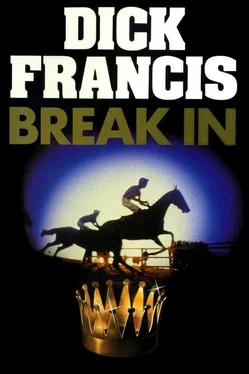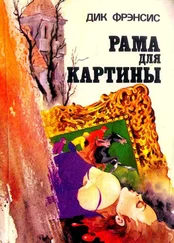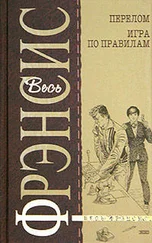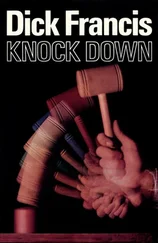‘Well?’ Eric Olderjohn asked, watching.
‘That’s odd,’ I said blankly.
‘Yes, curious, I agree.’
He held out his hand for the letters, took them from me, snapped them safely back into his case. I sat with thoughts tumbling over themselves and unquestioned assumptions melting like wax.
Was it true, I had wanted to know, if Maynard Allardeck was being considered for a knighthood, and if so, who knew?
The people who had proposed him; they knew.
The letter from the charity, dated 1 October, had been signed by Lord Vaughnley.
‘Why,’ I said, ‘did your certain person allow you to show these letters to me?’
‘Ah.’ Eric Olderjohn joined his fingers together in a steeple and studied them for a while. ‘Why do you think?’
‘I would suppose,’ I said, ‘he might think it possible I would stir up a few ponds, get a few muddy answers, without him having to do it himself.’
Eric Olderjohn switched his attention from his hands to my face. ‘Something like that,’ he said. ‘He would like to know for sure Maynard Allardeck isn’t just the victim of a hate campaign, for instance. He wants to do him justice. To put him back on the list, perhaps, for a knighthood next time around, in the summer.’
‘He wants proof?’ I asked.
‘Can you supply it?’
‘Yes, I think so.’
‘What are you planning to do,’ he asked with dry humour, ‘when you have to give up race-riding?’
‘Jump off a cliff, I dare say.’
I stood up, and he also. I thanked him sincerely for the trouble he’d taken. He said he would expect me to win again on his horse next time out. Do my best, I said, and took a last appreciative glance round his bower of a sitting room before making my way back to the hotel.
Lord Vaughnley, I thought.
On 1 October he had recommended Maynard for a knighthood. By the end of that month or the beginning of November there had been a tap on Bobby’s telephone.
The tap had been installed by Jay Erskine, who had listened for two weeks and then written the articles in the Flag .
Jay Erskine had once worked for Lord Vaughnley, as crime reporter on the Toumcrier .
But if Lord Vaughnley had got Jay Erskine to attack Maynard Allardeck, why was Nestor Pollgate so aggressive?
Because he didn’t want to have to pay compensation, or to admit his paper had done wrong.
Well... perhaps.
I went round in circles and came back always to the central and unexpected question: Was it really Lord Vaughnley who had prompted the attacks, and if so, why?
From my hotel room I telephoned Rose Quince’s home, catching her again soon after she had come in.
‘Bill?’ she said. ‘Civil Service charity? Oh, sure, he’s a patron of dozens of things. All sorts. Keeps him in touch, he says.’
‘Mm,’ I said. ‘When you wrote that piece about Maynard Allardeck, did he suggest it?’
‘Who? Bill? Yes, sure he did. He put the clippings from the Flag on my desk and said it looked my sort of thing. I may know him from way back, but he’s still the ultimate boss. When he wants something written, it gets written. Martin, our big white chief, always agrees to that.’
‘And, er, how did you get on to the How’s Trade interview? I mean, did you see the programme when it was broadcast?’
‘Do me a favour. Of course not.’ She paused. ‘Bill suggested I try the television company, to ask for a private re-run.’
‘Which you did.’
‘Yes, of course. Look,’ she demanded, ‘what’s all this about? Bill often suggests subjects to me. There’s nothing strange in it.’
‘No,’ I said. ‘Sleep well, Rose.’
‘And goodnight to you, too.’
I slept soundly and long, and early in the morning took the video camera and drove to Purfleet along the flat lands just north of the Thames estuary. The rains of the day before had drawn away, leaving the sky washed and pale, and there were seagulls wheeling high over the low-tide mud.
I asked in about twenty places, post office and shops, before I found anyone who had heard of Purfleet Electronics, but was finally pointed towards someone who had worked there. ‘You want George Tarker... he owned it,’ he said.
Following a few further instructions from helpful locals, I eventually pulled up beside a shabby old wooden boatshed optimistically emblazoned with a sign-board saying ‘George Tarker Repairs All’.
Out of the car and walking across the pot-holed entrance yard to the door one could see that the sign had once had a bottom half, which had split off and was lying propped against the wall, and which read ‘Boats and Marine Equipment’.
With a sinking feeling of having come entirely to the wrong place I pushed open the rickety door and stepped straight into the untidiest office in the world, a place where every surface and every shelf was covered with unidentifiable lumps of ships’ hardware in advanced age, and where every patch of wall was occupied by ancient calendars, posters, bills and instructions, all attached not by drawing pins but by nails.
In a sagging old chair, oblivious to the mess, sat an elderly grey-bearded man with his feet up on a desk, reading a newspaper and drinking from a cup.
‘Mr Tarker?’ I said.
‘That’s me.’ He lowered the paper, looking at me critically from over the soles of his shoes. ‘What do you want repaired?’ He looked towards the bag I was carrying, which contained the camera. ‘A bit off a boat?’
‘I’m afraid I’ve come to the wrong place,’ I said. ‘I was looking for Mr George Tarker who used to own Purfleet Electronics.’
He put his cup down carefully on the desk, and his feet on the floor. He was old, I saw, from an inner weariness as much as from age: it lay in the sag of his shoulders and the droop of his eyes and shouted from the disarray of everything around him.
‘That George Tarker was my son,’ he said.
Was.
‘I’m sorry,’ I said.
‘Do you want anything repaired, or don’t you?’
‘No,’ I said. ‘I want to talk about Maynard Allardeck.’
The cheeks fell inwards into shadowed hollows and the eyes seemed to recede darkly into the sockets. He had scattered grey hair, uncombed, and below the short beard, in the thin neck inside the unbuttoned and tieless shirt, the tendons tightened and began to quiver.
‘I don’t want to distress you,’ I said: but I had. ‘I’m making a Him about the damage Maynard Allardeck has done to many people’s lives. I hoped you... I hoped your son... might help me.’ I gestured vaguely with one hand. ‘I know it wouldn’t sway you one way or another, but I’m offering a fee.’
He was silent, staring at my face but seeing, I thought, another scene altogether, looking back into memory and finding it almost past bearing. The strain in his face deepened to the point when I did actively regret having come.
‘Will it destroy him, your film?’ he said huskily.
‘In some ways, yes.’
‘He deserves hellfire and damnation.’
I took the video camera out of its bag and showed it to him, explaining about talking straight at the lens.
‘Will you tell me what happened to your son?’ I asked.
‘Yes, I will.’
I balanced the camera on a heap of junk and started it running; and with few direct questions from me he repeated in essence the familiar story. Maynard had come smiling to the rescue in a temporary cash crisis caused by a rapid expansion of the business. He had lent at low rates, but at the last and worst moment demanded to be repaid; had taken over the firm and ousted George Tarker, and after a while had stripped the assets, sold the freehold and put the workforce on the dole.
Читать дальше




